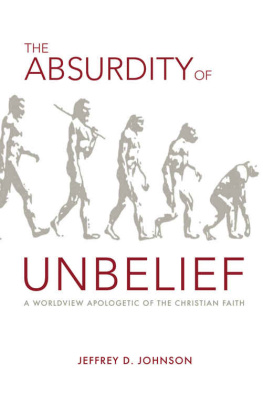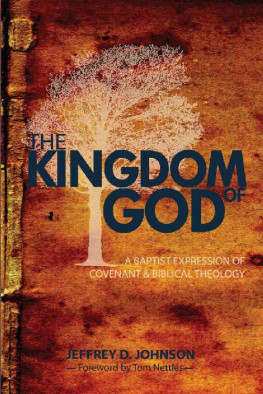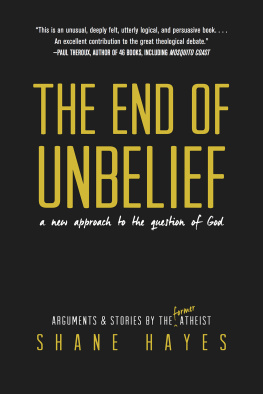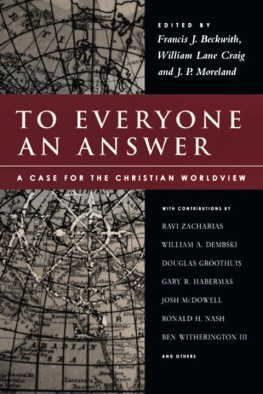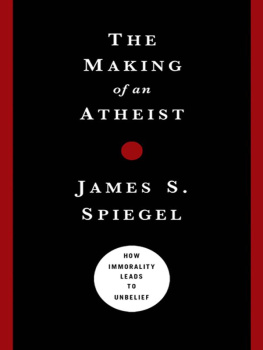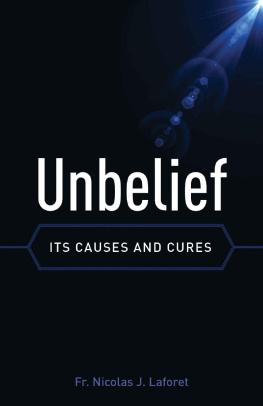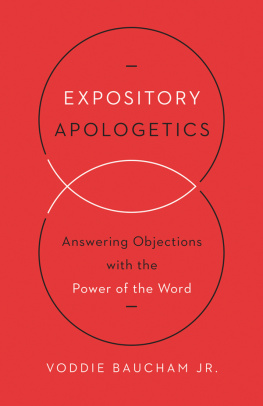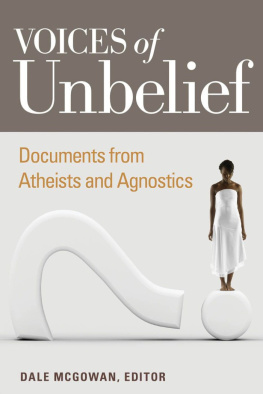Agnostics and atheists have been making a lot of noise inrecent years, in spite of the fact that their belief systems are flawed. Tocounter their propaganda we need a flow of books exposing just how flimsy theirarguments are. Jeffrey Johnson has chosen the word absurdity to characterisethese, and he has chosen well. Chapter by chapter he strips unbelief of anyvestige of credibility, then shows with crystal clarity why the biblical casefor God stands supreme when contrasted with all other philosophical andreligious belief systems. I predict that this book will be as great a help tomany of its readers as it has been to me, and I commend it warmly.
John Blanchard
Author of Does God Believe in Atheists?
* * *
The Bible doesnt merely state the atheists creed, itprovides us with an assessment of that creed: The fool has said in his heart,There is no God (Psalm 14:1). In his new book The Absurdity of Unbelief,Jeffrey Johnson ably demonstrates that the Scripture writer isnt hurlinginsults or engaging in ad hominem. Rather, as Johnson shows, the Bibleis simply telling the truth. To reject the triune God of Scripture and toreplace him with a non-biblical worldview is self-defeating. How does Johnsondefend this thesis (and biblical claim)? First, he argues that human beliefsare not neutral but are in certain ways biased and preconditioned. Next,Johnson proceeds, by means of reductio ad absurdum, to expose theirrationality of the worlds major non-biblical philosophies and unbiblicalreligions. Finally, Johnson carefully sets forth the arguments and lays out theevidence for the veracity of Christianity, and he concludes with an earnest andhumble appeal to receive the gospel of Jesus Christ, which alone can restoretrue meaning to the world and wherein is found true wisdom from God. TheAbsurdity of Unbelief will challenge the unbelievers skepticism and willconfirm the believers faith. I highly recommend it!
Robert R. Gonzales Jr.
Author of Where Sin Abounds
* * *
Jeffrey Johnsons new book, The Absurdity of Unbelief,demonstrates the absurdity of most of the worldviews which parade themselves astruth naturalism, relativism, atheism, existentialism, pantheism,materialism, and the rest. He clearly examines the premises of each systemof thought and demonstrates their many contradictions. His scholarship andhistorical understanding of the entire field of philosophy and the otherso-called religions is evident throughout the book. He has done a masterful jobin showing that the Christian worldview is the only system that will meet allthe tests of logic and ethics. He concludes this excellent work with apassionate call to submit ourselves to the God of the Scriptures who has givenus His son, Jesus Christ, who will remove all of our sin and guilt. Totrust in any of the other philosophical or religious positions while refusingto accept Gods gracious offer of salvation is indeed absurd!
Curtis C. Thomas
Author of Practical Wisdom for Pastors
* * *
A major strength of Jeffrey Johnsons Absurdity ofUnbelief is its step-by-step systematic approach. He explains what faith is(and is not), what factors drive us to adopt our beliefs, how to test them,fatal difficulties on all systems of thought not built on the foundation ofChrist, grounds for holding to Christian theism, and a passionate call to faithin Jesus. Along the way he examines Christian and non-Christian thinkers andmovements both ancient and contemporary, demonstrating that the principlesunderlying a biblical apologetic equally apply to all forms of unbelief. I planon coming back to this book again and again.
Joseph E. Torres
Editor and coauthor with John M. Frame, Apologetics: AJustification of Christian Belief, and blogger at KINGDOMVIEW
* * *
As Christians struggle to hold onto a semblance of sanity inthe midst of the collapse of Western morality and thought, a sound foundationupon which to stand in explaining our unwillingness to bow the knee to Caesaris a must. In The Absurdity of Unbelief, Jeffrey Johnson providesa clear and compelling case for the Christian faith, readable and usable forbeliever and unbeliever alike.
James R. White
Director of Alpha and Omega Ministries
Copyright 2016 Jeffrey D. Johnson
All Rights Reserved.
All rights reserved. Writtenpermission must be secured from the author to use or reproduce any part of thisbook, except for brief quotations in critical review or articles.
Published by Free Grace Press, FreeGracePress.com
Cover design by Scott Schaller, ScottSchallerDesigns.com
eBook formatting by Jon J. Cardwell,EclecticCattleProds.com
Scripture is taken from The HolyBible, English Standard Version, copyright 2001 by Crossway Bibles, adivision of Good News Publishers. Used by Permission. All rights reserved.
To mybrothers
James & Jason Johnson
Tableof Contents
Preface
One cannot deny logical and ethical absolutes without theuse of the laws of logic and ethics in the process. If some say they dont careabout logic, then they might as well say that they are okay with soundingabsurd. Why would anyone want to take them seriously? If some do not care aboutbeing ethical, then why would anyone want to trust them when they admit thatlying is okay?
Without God, there is no meaning, no truth, no rationality,and no ethical standard. Because without God and specifically the God of theBible there is no foundation for logic or ethics to be utilized inargumentation at all (as we shall see).
In other words, I dont believe in intellectual atheistsanymore than I believe in relativists who take relativism seriously. Sure,there are plenty who call themselves atheists, but deep down, they are lying tothemselves. Sure, there are plenty who hold to relativistic thinking, but thisdoes not mean that they truly think it is okay for others to cheat, defraud,exploit, or kill them. No matter how postmodern and open-minded many may thinkthey are, they cannot help but get incensed when others take advantage of them.So, no, I dont believe in atheists or relativists.
Knowing this is a bold way to introduce a book on Christianapologetics, I would only challenge you to try to remain honest with yourselfas you read this book. If you happen to be a self-proclaimed atheist, agnostic,or skeptic, see if you can be honest with your conscience and continue to denythe existence of God.
I hope that all skeptics of Christianity read this book, notbecause I feel I have written the best book on the subject, but because I ampersuaded by the coherency of the Christian worldview that Christianity istrue. It is the only worldview that is intellectually and practicallydefensible, for it is the only worldview that can give a coherent answerto why there are logical and ethical absolutes.
I write with certainty, but that does not mean this book iscertain to bring any unbeliever away from his or her unbelief. Even though I amconvinced that Christianity is both right and defensible, I am not convincedthat this is enough to convince unbelieving skeptics.
The problem with unbelief, as I explain in PART 2, is not alack of evidence or rational warrant; unbelief is due to a lack of appreciationfor the truth. Faith in Christ requires more than just intellectual knowledgeof Christ; it requires a love for Christ that comes only by the illumination ofthe Spirit (as we shall see in chapter 26). This is something that goes beyondthe reach of apologetics, for only God can reveal Himself to us in such a wayfor us to be willing to sell all that we have and follow Him.
Though I cannot be certain this book will be of any eternalvalue for unbelievers, I can write with the knowledge that apologetics is agreat value to those who already love the Lord Jesus. In some ways, apologeticsis more helpful for believers than for non-believers. This may sound odd, sincebelievers already have faith in Christ, but just as the gospel is continuouslybeneficial for believers, Christian apologetics is helpful in strengthening andencouraging the faith of those who already believe especially if we have abiblical apologetic,

